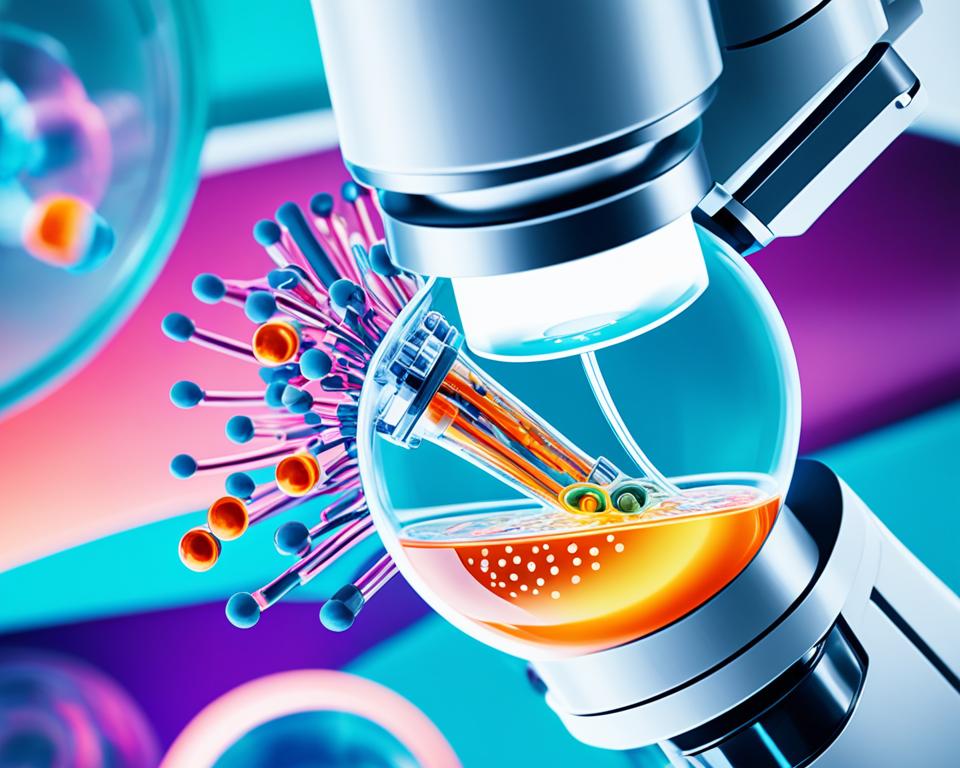IGA (Immunoglobulin A) Nephropathy, also known as Berger’s disease, is a chronic kidney condition characterized by the deposition of immunoglobulin A antibodies in the glomeruli, the filtration units of the kidneys. This autoimmune disorder can lead to inflammation, scarring, and progressive kidney damage. In this article, we will explore the latest advancements in the treatment of IGA Nephropathy, including emerging therapies, personalized care approaches, and the promising future directions in managing this complex kidney disease.
Read interesting things at : trainwithnexus
Key Takeaways
- IGA Nephropathy is a chronic kidney condition caused by the deposition of immunoglobulin A antibodies in the glomeruli.
- Researchers are exploring new and innovative treatment options for IGA Nephropathy, including targeted immunotherapies, complement inhibitors, and proteasome inhibitors.
- Personalized treatment plans and multidisciplinary care are becoming increasingly important in managing IGA Nephropathy.
- Ongoing clinical trials are investigating the efficacy and safety of emerging therapies for IGA Nephropathy.
- Future advancements in gene therapy and stem cell therapy hold promise for the management of IGA Nephropathy.
Understanding IGA Nephropathy
IGA Nephropathy, also known as Immunoglobulin A Nephropathy or Berger’s disease, is a type of glomerulonephritis, a group of kidney diseases that affect the glomeruli. In IGA Nephropathy, the immune system produces abnormal immunoglobulin A (IgA) antibodies, which accumulate in the glomeruli, leading to inflammation and damage over time.
What is IGA Nephropathy?
IGA Nephropathy is a chronic kidney condition characterized by the deposition of IgA antibodies in the glomeruli, the filtration units of the kidneys. This autoimmune disorder can result in inflammation, scarring, and progressive kidney disease.
Causes and Risk Factors
The exact causes of IGA Nephropathy are not fully understood, but genetic, environmental, and immunological factors are believed to play a role. Individuals with a family history of the condition, as well as those with certain genetic predispositions or underlying autoimmune disorders, are at a higher risk of developing IGA Nephropathy.
Symptoms and Diagnosis
Common symptoms of IGA Nephropathy include proteinuria, hematuria, and, in some cases, hypertension and impaired kidney function. Diagnosis typically involves a combination of urine tests, blood tests, and a kidney biopsy to confirm the presence of IgA deposits and assess the extent of kidney disease.
Conventional Treatment Approaches
The traditional treatment approach for IGA nephropathy has focused on the use of
corticosteroids
and
immunosuppressant medications
. Corticosteroids, such as prednisone, can help reduce inflammation and slow the progression of the disease, while immunosuppressants, like cyclophosphamide or mycophenolate mofetil, aim to suppress the overactive immune response.
Corticosteroids and Immunosuppressants
However, these conventional therapies are not always effective, and they can also lead to significant side effects. Patients with IGA nephropathy who receive corticosteroids or immunosuppressants may experience a range of adverse effects, including weight gain, high blood pressure, diabetes, and increased susceptibility to infections.
Managing Complications
In addition to the primary treatment of IGA nephropathy, managing the complications of the disease is an essential aspect of patient care. Complications such as high blood pressure, proteinuria, and anemia can significantly impact an individual’s overall health and quality of life. Healthcare providers must closely monitor these complications and implement appropriate strategies to address them, including the use of antihypertensive medications, dietary modifications, and anemia management.
IGA Nephropathy New Treatment
While conventional treatments have been the mainstay of IGA nephropathy management, there is a growing focus on exploring new and innovative treatment options for this condition. As our understanding of the underlying disease mechanisms continues to evolve, researchers and clinicians are investigating a range of novel therapies that target specific pathways involved in the development and progression of IGA nephropathy.
These innovative nephropathy therapies hold promise in addressing the complex nature of kidney disease and providing new avenues for more effective treatment. By targeting specific molecular and cellular mechanisms, these emerging approaches aim to halt the progression of the disease, reduce proteinuria, and potentially restore kidney function in individuals living with IGA nephropathy.
As the landscape of kidney disease new treatments continues to expand, healthcare providers and researchers are working collaboratively to bring these promising therapies from the laboratory to the clinic, ensuring that patients with IGA nephropathy have access to the most advanced and personalized care available.
Emerging Therapies for IGA Nephropathy
As advancements in the understanding of IGA nephropathy continue to unfold, researchers and clinicians are exploring a range of novel therapeutic approaches that hold promise for improving patient outcomes. These emerging therapies, which include targeted immunotherapies, complement inhibitors, and proteasome inhibitors, offer new avenues for managing this complex autoimmune kidney disorder.
Targeted Immunotherapies
Targeted immunotherapies aim to modulate the immune system and address the underlying cause of IGA nephropathy – the production and deposition of abnormal immunoglobulin A (IgA) antibodies. By selectively targeting the specific immune pathways involved in this process, these therapies have the potential to reduce inflammation, slow disease progression, and preserve kidney function.
Complement Inhibitors
The complement system, a crucial component of the immune response, plays a significant role in the inflammatory processes associated with IGA nephropathy. Complement inhibitors, such as eculizumab and avacopan, are being investigated as a means of disrupting the complement cascade and mitigating the damaging effects of inflammation on the glomeruli.
Proteasome Inhibitors
Proteasome inhibitors, like bortezomib, have shown promising results in reducing proteinuria and slowing the progression of IGA nephropathy. These therapies work by interfering with the proteasome, a complex responsible for the degradation of proteins, which may help alleviate the burden of abnormal IgA accumulation and subsequent kidney damage.
The development and clinical evaluation of these emerging therapies for IGA nephropathy are ongoing, with several clinical trials underway to assess their efficacy and safety. As researchers continue to explore these novel treatment approaches, the hope is that they will pave the way for more effective and targeted interventions that can improve the quality of life for individuals living with this chronic kidney condition.
Clinical Trials and Ongoing Research
Numerous IGA nephropathy clinical trials are currently investigating the efficacy and safety of emerging therapies for this condition. Researchers are actively exploring novel treatment approaches, evaluating their potential to slow disease progression, reduce proteinuria, and improve overall kidney function. These ongoing studies are essential in advancing our understanding of IGA nephropathy and paving the way for more effective and targeted treatment options.
One such study, the PROTECT IGA trial, is examining the use of a novel complement inhibitor in patients with IGA nephropathy. The researchers aim to determine if this targeted therapy can reduce proteinuria and preserve kidney function. Similarly, the NEFIGAN trial is evaluating the efficacy of a targeted immunotherapy in slowing the progression of IGA nephropathy.
In addition to these clinical trials, researchers are also conducting in-depth nephropathy research to better understand the underlying mechanisms of IGA nephropathy. This knowledge is crucial for the development of innovative, personalized treatment strategies that can address the specific needs of each patient.
The continuous kidney disease clinical studies focusing on IGA nephropathy are a testament to the medical community’s dedication to advancing the treatment options for this complex kidney condition. As these studies progress, we can expect to see more promising results and a brighter future for individuals living with IGA nephropathy.
Personalized Treatment Plans
In addition to the emerging therapies for IGA nephropathy, the management of this condition is also evolving towards a more personalized approach. Recognizing the complex and heterogeneous nature of IGA nephropathynephropathy personalized treatment>, healthcare providers are emphasizing the importance of multidisciplinary carenephropathy personalized treatment>, involving nephrologists, dietitians, and other specialists to develop tailored treatment plans.
Importance of Multidisciplinary Care
By incorporating a multidisciplinary kidney carenephropathy personalized treatment> approach, healthcare teams can address the unique needs of each individual with IGA nephropathy. This collaborative effort allows for a comprehensive evaluation of the patient’s medical history, genetic factors, and lifestyle, enabling the development of a personalized treatment strategy that takes into account the specific manifestations and progression of the disease.
Lifestyle Modifications
In addition to targeted pharmacological interventions, lifestyle changesnephropathy personalized treatment> can play a crucial role in managing IGA nephropathy and slowing disease progression. Dietary modifications, weight management, and regular exercise have been shown to positively impact kidney function and overall health in individuals with IGA kidney diseasenephropathy personalized treatment>. By incorporating these lifestyle adjustments as part of a comprehensive treatment plan, patients can actively participate in their care and potentially improve their long-term outcomes.

Managing Side Effects and Complications
As individuals with IGA nephropathy undergo treatment, it is critical to closely monitor for potential side effects and complications associated with both conventional and emerging therapies. This comprehensive approach to patient care ensures the preservation of kidney function and the mitigation of additional health risks.
Monitoring Kidney Function
Regular blood and urine tests play a vital role in tracking the kidney function of patients with IGA nephropathy. By closely monitoring biomarkers such as creatinine, glomerular filtration rate (GFR), and electrolyte levels, healthcare providers can detect any changes or declines in kidney function and make timely adjustments to the treatment plan. This proactive monitoring strategy allows for early intervention and the prevention of further kidney damage.
Addressing Proteinuria
The management of proteinuria, a hallmark symptom of IGA nephropathy, is a crucial aspect of patient care. Elevated levels of protein in the urine can indicate ongoing kidney damage and an increased risk of complications. Healthcare providers may employ various therapeutic approaches, such as the use of angiotensin-converting enzyme (ACE) inhibitors or angiotensin II receptor blockers (ARBs), to help reduce proteinuria and preserve overall kidney function. Regular monitoring of protein levels in the urine is essential in ensuring the effectiveness of these interventions.
Patient Education and Support
Empowering patients with IGA nephropathy is a vital component of effective disease management. By providing comprehensive patient education on the nature of the condition, available treatment options, and strategies for managing symptoms and complications, healthcare providers can help individuals actively participate in their care.
Additionally, connecting patients with reliable kidney disease support resources, such as patient advocacy groups and educational materials, can offer invaluable guidance and support throughout the treatment journey. These resources can serve as a crucial lifeline, empowering patients to navigate the complexities of IGA nephropathy and make informed decisions about their healthcare.
Accessing Reliable Resources
Patients with IGA nephropathy can explore a wealth of information and support through various channels, including:
- Patient advocacy organizations that offer educational resources, support groups, and guidance on navigating the healthcare system
- Online platforms and forums where individuals can connect with others living with IGA nephropathy, share experiences, and obtain peer-to-peer support
- Comprehensive educational materials, such as brochures, websites, and webinars, that provide in-depth information about the condition, its management, and the latest advancements in treatment
- Referrals to specialized healthcare providers, including nephrologists, dietitians, and mental health professionals, who can offer personalized care and support
By empowering patients with reliable resources and education, healthcare providers can empower individuals with IGA nephropathy to become active partners in their care, ultimately leading to better outcomes and an enhanced quality of life.
Promising Future Directions
As researchers continue to deepen their understanding of the underlying mechanisms of IGA Nephropathy, the future holds promise for even more innovative and targeted treatment approaches. Advancements in gene therapy and precision medicine may pave the way for personalized interventions that address the genetic and molecular drivers of the disease.
Gene Therapy and Precision Medicine
The field of gene therapy holds exciting potential for the management of IGA Nephropathy. By targeting the specific genetic factors that contribute to the development and progression of the disease, researchers aim to develop tailored treatments that can address the root causes of the condition. This personalized approach, known as precision medicine, has the potential to improve patient outcomes and minimize the adverse effects often associated with conventional therapies.
Stem Cell Therapy
Additionally, the potential of stem cell therapy to regenerate damaged kidney tissue and restore function holds promising implications for the management of IGA Nephropathy and other kidney disease innovations. By harnessing the regenerative capabilities of stem cells, clinicians may be able to develop new treatment strategies that can reverse the damage caused by the disease and potentially restore normal kidney function.

Collaboration and Partnerships
Addressing the challenges of IGA Nephropathy requires a collaborative effort among healthcare providers, researchers, patient advocacy groups, and other stakeholders. Patient advocacy organizations play a crucial role in raising awareness, advocating for better access to care, and supporting the needs of individuals affected by this condition.
Role of Patient Advocacy Groups
Patient advocacy groups, such as the IGA Nephropathy Foundation and the National Kidney Foundation, have been instrumental in amplifying the voices of those living with IGA nephropathy. These organizations work tirelessly to educate the public, lobby for policies that improve access to treatments, and provide resources and support services to patients and their families. By collaborating with these groups, healthcare providers and researchers can gain valuable insights into the lived experiences of individuals with IGA nephropathy, ultimately shaping more patient-centric approaches to care.
Fostering Research Collaborations
Fostering research collaborations, both nationally and internationally, can also accelerate the development of new therapies and improve our understanding of this complex kidney disease. By sharing data, pooling resources, and leveraging expertise across different research institutions and clinical centers, the IGA nephropathy research community can make significant strides in unraveling the underlying mechanisms of the disease and identifying more effective treatment strategies. These collaborative efforts can also help to streamline clinical trials, ensuring that promising new therapies reach patients more efficiently.
The table below highlights some of the key IGA nephropathy research partnerships and collaborations that have been instrumental in advancing the field:
| Partnership/Collaboration | Focus | Key Achievements |
|---|---|---|
| IGA Nephropathy Consortium | Multinational collaboration to study the genetic and molecular mechanisms of IGA nephropathy | Identification of genetic variants associated with disease susceptibility and progression, development of novel biomarkers |
| Kidney Disease: Improving Global Outcomes (KDIGO) IGA Nephropathy Guideline | International collaboration to develop evidence-based clinical practice guidelines for the management of IGA nephropathy | Establishment of standardized diagnostic and treatment approaches, improving patient care globally |
| National Institutes of Health (NIH) IGA Nephropathy Research Network | Collaborative network of researchers and clinicians focused on advancing IGA nephropathy research and translating findings into clinical practice | Facilitation of multicenter clinical trials, creation of patient registries, and integration of basic science and clinical research |
By leveraging the expertise and resources of these collaborative efforts, the IGA nephropathy community can continue to make meaningful progress in improving outcomes for individuals living with this complex kidney condition.
Ethical Considerations
As new and innovative treatments for IGA nephropathy emerge, it is essential to consider the ethical implications of their development and implementation. One of the key concerns is ensuring equitable access and affordability to these therapies, as patients from diverse socioeconomic backgrounds should have the opportunity to benefit from the advancements in IGA nephropathy treatment.
Access and Affordability
Healthcare systems and policymakers must work to address the barriers that may hinder access to these novel IGA nephropathy treatments. This includes evaluating insurance coverage, exploring financial assistance programs, and collaborating with patient advocacy groups to ensure that cost does not prevent individuals from obtaining the care they need. Achieving a balance between innovation and accessibility is crucial in providing iga nephropathy ethical considerations for patients.
Informed Consent and Clinical Trials
The ethical conduct of clinical trials for IGA nephropathy treatments is also of paramount importance. Researchers and healthcare providers must uphold the highest standards of informed consent, ensuring that participants fully understand the potential risks, benefits, and alternatives before enrolling in a study. Additionally, the trial design and data collection processes must be transparent and adhere to established ethical guidelines to protect the rights and well-being of individuals with IGA nephropathy.
By addressing these treatment access and clinical trial ethics considerations, the healthcare community can work towards ensuring that the advancements in IGA nephropathy treatment are distributed equitably and that the interests and safety of patients are prioritized throughout the development and implementation of these innovative therapies.
Challenges and Limitations
As the treatment landscape for IGA Nephropathy continues to evolve, there are still significant challenges and limitations that must be addressed. One of the primary concerns is the issue of access barriers to these emerging therapies. The high cost of innovative treatments, coupled with disparities in insurance coverage and geographic availability, can hinder patients’ ability to access the care they need.
Barriers to Treatment Access
The cost of novel IGA Nephropathy treatments can be prohibitive for many patients, especially those with limited financial resources or inadequate insurance coverage. This issue disproportionately impacts underserved communities, where access to specialized kidney care may be more limited. Ensuring equitable access to these transformative treatments is crucial to improving outcomes for all individuals living with IGA Nephropathy.
Adverse Effects and Safety Concerns
While the promise of new therapies is exciting, the potential for adverse effects and safety concerns must be carefully evaluated. Emerging treatments, such as targeted immunotherapies and complement inhibitors, may carry unique risks that require close monitoring and vigilant management. Addressing these safety considerations is essential to ensuring the well-being of patients and building confidence in the use of these innovative interventions.
Conclusion
In conclusion, the landscape of IGA Nephropathy treatment is rapidly evolving, driven by a growing understanding of the underlying disease mechanisms and the development of novel therapeutic approaches. From targeted immunotherapies to complement inhibitors and proteasome inhibitors, the research community is actively exploring new avenues to improve patient outcomes and slow the progression of this chronic kidney condition.
By adopting a personalized, multidisciplinary approach to care and addressing the ethical considerations surrounding access and safety, healthcare providers can work to ensure that individuals with IGA Nephropathy receive the most comprehensive and effective treatment possible. As research continues to advance, the future holds promising directions for the management of this complex autoimmune kidney disorder.
The key takeaways from this discussion on IGA Nephropathy include the emergence of innovative treatments, the importance of personalized care, and the ongoing efforts to overcome the challenges and limitations associated with this condition. With a collaborative and multidisciplinary approach, healthcare professionals and researchers can strive to provide better care and improved outcomes for patients living with IGA Nephropathy.


